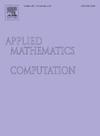高阶全驱动系统的自适应容错最优控制及其在航天器姿态跟踪中的应用
IF 3.4
2区 数学
Q1 MATHEMATICS, APPLIED
引用次数: 0
摘要
研究了高阶全驱动系统的自适应最优跟踪问题。首先,提出了一种基于FAS理论和强化学习(RL)的最优控制策略,有效地解决了actor-critic框架下的跟踪问题。其次,在辨识器-行为者-批评框架下,介绍了一种针对执行器故障的高阶FAS的滑模优化控制方案。具体而言,与现有的高阶FAS容错控制结果不同,该方法即使在执行器存在故障的情况下也能确保轨迹跟踪和性能优化,同时避免了对持续激励条件的需要。考虑滑模控制(SMC)具有鲁棒性强、响应速度快的优点,通过建立(n-1)阶滑模曲面,实现多变量同步快速跟踪和最优控制。通过严密的理论分析,证明了闭环系统中所有信号的有界性。最后,通过数值仿真和航天器姿态系统实例验证了所提控制方法的有效性。本文章由计算机程序翻译,如有差异,请以英文原文为准。
Adaptive fault tolerant optimal control for high-order fully actuated system and its application in spacecraft attitude tracking using reinforcement learning
This study addresses the adaptive optimal tracking problem for high-order fully actuated system (FAS). First, an optimal control strategy based on FAS theory and reinforcement learning (RL) is proposed, effectively solving the tracking problem within the actor-critic framework. Next, within the identifier-actor-critic framework, a sliding mode optimized control scheme for high-order FAS with actuator fault is introduced. Specifically, unlike existing fault-tolerant control results for high-order FAS, this method ensures trajectory tracking and performance optimization even in the presence of actuator faults, while avoiding the need for persistent excitation condition. Considering the strong robustness and rapid response advantages of sliding mode control (SMC), synchronous rapid tracking and optimal control of multiple variables are achieved by establishing a (n-1)-order sliding mode surface. Furthermore, rigorous theoretical analysis proves the boundedness of all signals within the closed-loop system. Finally, the effectiveness of the proposed control approaches are verified by a numerical simulation and a practical example of the spacecraft attitude system.
求助全文
通过发布文献求助,成功后即可免费获取论文全文。
去求助
来源期刊
CiteScore
7.90
自引率
10.00%
发文量
755
审稿时长
36 days
期刊介绍:
Applied Mathematics and Computation addresses work at the interface between applied mathematics, numerical computation, and applications of systems – oriented ideas to the physical, biological, social, and behavioral sciences, and emphasizes papers of a computational nature focusing on new algorithms, their analysis and numerical results.
In addition to presenting research papers, Applied Mathematics and Computation publishes review articles and single–topics issues.

 求助内容:
求助内容: 应助结果提醒方式:
应助结果提醒方式:


